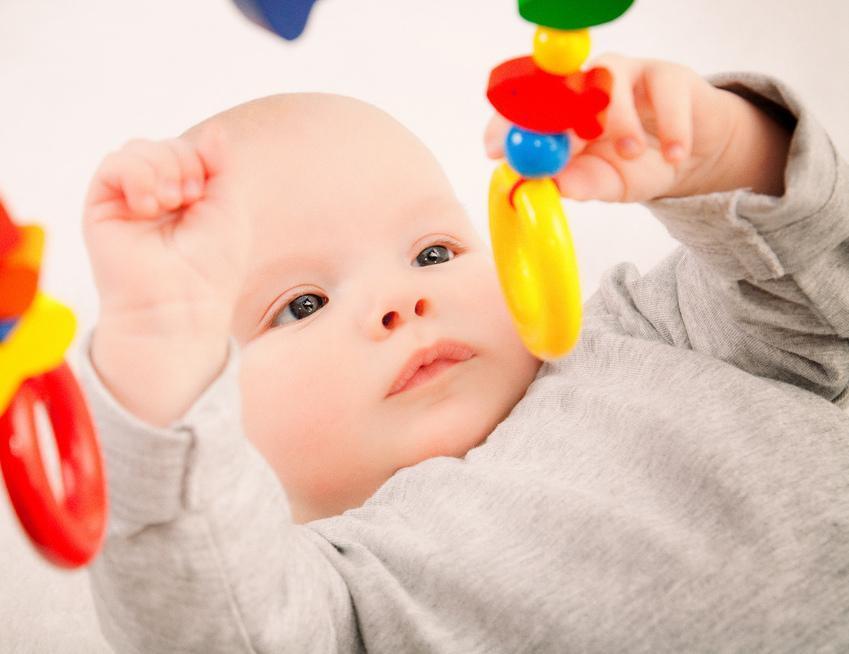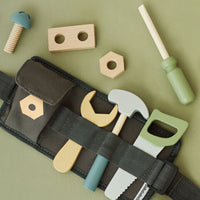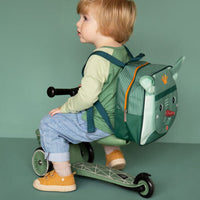What is reflux and how can it affect your little one's sleeping and behavioural habits? We spoke to The Reflux Lady, Aine Homer, all about how to recognise reflux and ways to begin treating it.
Reflux – a Symptom or a Cause?

So many babies are being diagnosed with Reflux or Silent Reflux, but reflux is completely normal. Reflux (Gastro Oesophageal Reflux) is when the contents of the stomach regurgitate up from the stomach into the oesophagus.
Babies have a naturally immature digestive system. This is one reason why they are exclusively milk-fed for about the first 6 months of life, as their digestive system cannot cope with anything else.
As part of that digestive development, the Lower Oesophageal Sphincter muscle, that shuts off the oesophagus from the stomach is naturally weaker than in older children and adults. It will strengthen naturally with growth.
And most babies will spit up, or even vomit regularly. This is not a problem.
when does reflux become a problem and what should we do about it?
Reflux becomes a problem when it causes pain and discomfort. This is officially called GERD / GORD, Gastro OEesophageal Reflux Disease.
It is important to listen to your baby’s cries and observe behaviour and movement. If you think your baby is in pain or uncomfortable, chances are you are right. Trust yourself.
The most common symptoms that your baby might be uncomfortable include:
• Inconsolable crying
• Screaming
• Squirming and grunting
• Painful wind or gas
• Back arching
• Difficulty in settling
• Does not like lying down or having nappy changed
• Doesn’t stay asleep in own crib for long periods of time
• Constantly unhappy baby
Of great importance for reading your baby, is to understand if these symptoms are constantly with your baby, such that you would not describe your baby as a happy baby.
Displaying these symptoms does not mean that your baby needs medication for reflux. Far from it. It is important to understand what the cause of the reflux is, because most often reflux is a symptom and not a cause. Treating the reflux may not treat the cause, which can continue to irritate other parts of the body even with medication.
there are two main causes of reflux:
1) Too much air in the stomach which during digestion is forcefully removed. If it goes up it brings acid with it, if it goes down it causes bloating and abdominal pain and gas.
2) A food substance that baby is not yet ready to digest properly, this more often shows as abdominal pain, bloating and wind.
reflux in breastfed infants
In breastfed babies, too much air is swallowed because of a poor latch. This itself can be caused by a number of issues including jaw tightness (perhaps as a result of birth, no matter how gentle), tongue-tie (ankylosglossia) or other mechanical reasons.
International Board Certified Lactation Consultant (IBCLC) can access your baby’s latch and advise if a tongue-tie is present. Your IBCLC can also advise who can resolve a tongue-tie for you.
If your baby does not have a tongue-tie, then you may be able to see an osteopath or chiropractor who specialises in treating infants, who can diagnose and resolve mechanical issues.
There may be something in your breastmilk that is aggravating your baby, such as dairy produce. Cows Milk Protein Allergy (CMPA) presents with the same symptoms as reflux, and is often treated with reflux medication first before this does not work and a change in milk is advised to a non-dairy milk.
With breastfeeding – mum has total control over what goes into her milk through her diet and environment. Removing major allergens from her diet can make a massive impact on baby’s “reflux”.The major allergens to remove are dairy (including beef), gluten, eggs and nuts. If you keep a food and symptom diary, you can track down which foods could be causing particular symptoms.
If your baby has reflux, or CMPA, and is breastfed, the best way to minimise any milk having an impact on your baby’s immature digestive system is to keep breast-feeding and change what you eat. You may also find that medication may be required to completely return to happiness.
reflux in bottle-fed infants
Bottle-fed infants are also susceptible to drinking too much air, particularly as the bottle nipples do not deform the way a breast does, added to that, most bottles have a natural flow which means baby does not naturally remove excess air from their mouth before swallowing.
If you see your baby spilling or leaking milk from the mouth whilst feeding, there is too much air being drunk. A tongue-tie can make drinking from a bottle even more difficult and so should be assessed. A bottle-fed baby with a tongue tie will rarely feed easily or happily. I recommend seeing an osteopath or chiropractor who specialises in infant treatments, and ask specifically if there is a tongue-tire present.
If you suspect baby may have a tongue-tie, then find a tongue-tie practitioner who can assess and advice on resolution.
It is really important to diagnose and resolve a tongue tie as early as possible, it could have knock-on impacts to eating and speech in later months and years.
If all latch issues have been ruled out, it may be that baby has an intolerance or allergy to the milk they are drinking. Specialist milks are available, and due to different ingredients in all brands, there is no better milk than another for your baby, this is simply a matter of finding the right one for your baby, through trial and error.
other tips before a formal GERD diagnosis
It has been known that babies who are over-tired also exhibit many of signs of reflux, because they swallow too much air when they cry. So it is really important to do everything you can to make sure your baby is not just tired. If this means carrying them around for a day to sleep on your shoulder or in a carrier, that is fine to assess the situation. Remember, baby is too young to be forming “bad” habits at this stage, so holding them and comforting them is perfect, allowed, normal and boosts serotonin in both of you, once you accept that it is okay to take your time and focus on your baby.
A final skill to learn that can be blissful for baby and parents is infant massage. Tummy massage, in particular, can move trapped wind, and this is a beautiful activity for partners to learn to help bonding with baby. A beautiful addition to any bedtime routine.
Once you have ruled out the causes for reflux, if symptoms persist and you feel your baby is in too much discomfort, it is time to see your GP, describe in full what has been going on for your baby and ask for the next steps.
As a mum to two girls who between them have had diagnosed colic, reflux, silent reflux, CMPA, tongue-tie and other food intolerances and allergies; Aine Homer has experienced the “trial-and-error” approach of the medical community with no real answers or support. Feeling unsupported, dismissed and that it was all “in her head”, Aine was left with no choice but to take matters into her own hands. Her unique background of Traditional Chinese Medicine coupled with mechanical engineering, Maths and project management gave her the ability to search for underlying patterns for the causes of her daughters’ discomforts. The approach Aine now takes with all babies, is to answer the question “What is causing baby’s discomfort?” Once this simple question is answered, specific actions can be taken to resolve baby’s discomfort and reflux for good.
Aine is the author of The Baby Reflux Lady’s Survival Guide. And you can find her on Facebook. Instagram and her website.
feeding essentials
Follow us on our social channels!














